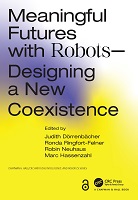Chapter 12 Design Fictio
Proposal review
The Future of Robots Needs Imagination
Author(s)
Ringfort-Felner, Ronda
Neuhaus, Robin
Dörrenbächer, Judith
Hassenzahl, Marc
Language
EnglishAbstract
What kind of robots do we want to live with in the future? Which ones do we not want? How will robots affect our everyday lives? What will be the consequences of our coexistence with them? Roboticists tend to focus on the product design of the robot, its exact configuration, and its technical implementation; rarely is any thought given to the far-reaching social consequences that might arise when a robot actually becomes part of our lives. So, this contribution is about how design can be used to imagine, visualize, and experience possible futures with the robots we want (or do not want). The authors introduce the design practices of Speculative Design and Design Fiction, discussing their practical applications and potential in the field of robotics. The authors offer several examples of Design Fiction projects that illustrate the use and utility of Speculative Design practices for robotic developers, researchers, and laypeople to discuss how the future of robots can be actively shaped through imagination and design. They then present a concrete tool for roboticists: A Design Fiction robot workshop where participants slip into the roles of various stakeholders to speculate about the future of mundane life with robots.
Keywords
a, aI, Coexistence, Designing, Dorrenbacher, Dörrenbächer, et, Felner, Futures, Hassenzahl, Judith, Marc, Meaningful, Neuhaus, New, Ringfort, Robin, Robots, RondaDOI
10.1201/9781003287445-12ISBN
9781032262673, 9781032246482, 9781003287445Publisher
Taylor & FrancisPublisher website
https://taylorandfrancis.com/Publication date and place
2023Imprint
CRC PressClassification
Computing and Information Technology
Robotics
Human–computer interaction


 Download
Download